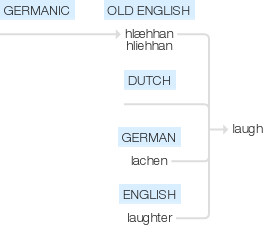Laughing
来自Big Physics
Safin(讨论 | 贡献)2022年4月27日 (三) 08:59的版本 (建立内容为“Category:etymology == google == [https://www.google.com.hk/search?q=laughing+etymology&newwindow=1&hl=en ref] Old English hlæhhan, hliehhan, of Germanic ori…”的新页面)
Old English hlæhhan, hliehhan, of Germanic origin; related to Dutch and German lachen, also to laughter.
wiktionary
From Middle English lawghynge; equivalent to laugh + -ing.
etymonline
laughing (n.)
mid-14c., verbal noun from laugh (v.). Laughing matter (usually with negative) is from 1560s. Nitrous oxide has been called laughing gas since 1842 (for its exhilarating effects). Humphry Davy, experimenting with the gas, discovered these as far back as 1779: "When I took the bag from my mouth, I immediately laughed. The laughter was involuntary, but highly pleasurable, accompanied by a thrill all through me."
